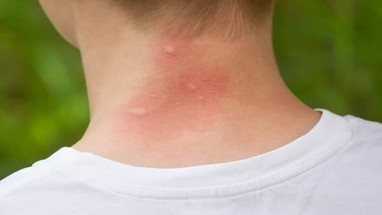29th Jul 2018
Easing Mosquito Bite Itch
Fight the itch with these solutions
What works – and what doesn’t – when it comes to mosquito bites
Mosquito bites are a fact of life in summer. Of course, you can reduce the chances of being bitten by using mosquito traps, repellents, and avoiding the outdoors in the evenings, but you’re still likely to get the odd itchy bite.
When a mosquito bites, it releases saliva into your skin, with enzymes designed to prevent your blood from clotting. Itching is your body’s reaction to those enzymes – your cells see the saliva as an invader, so they release histamines. These cause the bitten blood vessel to swell, and the area around the bite to redden and itch.
Fortunately, unless you’re in a country with mosquito-borne illnesses, itchy bites are not generally harmful. But they are annoying – particularly if you’re covered in them. Although there are a few effective ways to soothe the symptoms, many people have their own methods – some of which have no basis in science.
Here’s are some five ways to fight the itch – and some that probably won’t:
1. Calamine lotion
Calamine lotion is an old favourite, often used as a remedy for all kinds of skin complaints. Calamine is a mixture of zinc oxide and iron oxide and can help to cool and soothe irritated skin. Some newer forms also contain an analgesic to help relieve stinging.
2. Ice and cold compresses
Cooling bites with a cold compress or ice pack helps constrict the blood vessels around the bite, reducing swelling and relieving the itch.
3. Baking soda
Mix ordinary baking soda with a bit of water, then dab the paste on your bites. Leave for 15-20 minutes then rinse with cool water. Because baking soda is alkaline, it helps neutralise the affected area, soothing the itchiness.
4. Use an antihistamine
Antihistamines, as the name suggests, are designed to counteract the body’s histamine reaction. An over-the-counter antihistamine like Benadryl won’t work immediately but can help prevent histamines in your body from binding with receptors, so blood vessels return to normal and itching is reduced. Some people with particularly bad reactions to mosquito bites choose to minimise their body’s reaction by taking an antihistamine before going outside.
5. Use a hydrocortisone cream
Home remedies can work in a pinch, but specific creams and ointments are much more likely to work in the long term. Hydrocortisone creams are designed to reduce inflammation, redness, swelling and itching. Choose a cream with a concentration of 1% hydrocortisone to ensure it’s effective.
And here are 5 remedies that aren’t worth your time:
1. Scratching
Scratching feels satisfying in the moment but won’t help in the long term. In fact, scratching bites can actually irritate the skin further, causing more itching. Prolonged scratching can also tear the skin, which can lead to infection. Try to find a remedy that works for you so you’re not tempted to scratch.
2. Hot baths
A hot bath or shower is sometimes recommended to sooth bites. While this method may provide temporary relief, it’s unlikely to help for long. And, like scratching, heat can actually dry and irritate the skin, making the symptoms worse.
3. Honey
Honey is used for myriad health problems, but it’s not always the solution. Some types of honey, including manuka, can help fight bacteria and infection, but there’s no evidence that they can help soothe mosquito bites.
4. Bananas and potatoes
Two of the more unusual home remedies for mosquito bites involve food – specifically, banana peels and potatoes. Some people swear by rubbing a banana peel or cut potato on bites, but there is no evidence that these methods are effective.
5. Hot spoons
Another old wives tale suggests pressing a hot spoon against the bite. The idea is that the heat from the spoon breaks down the proteins causing the itch. The problem is, proteins usually break down at fairly high temperatures. If you did succeed in soothing your bites this way, you would probably end up with a burn in the process.
Do what works for you
The important thing is finding a solution that works for you. Some people swear by honey or hot spoons, and there’s no real harm in trying those methods. But it’s good to know what’s more likely to be effective, so you can be prepared this summer.
Of course, if you avoid being bitten in the first place, you won’t need relief from itching at all. One effective solution is using traps to reduce the overall population of mosquitoes on and around your property. Fewer mosquitoes means fewer bites, and far less itching all round.

